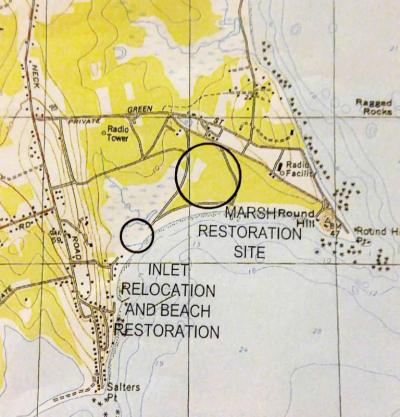UPDATE: salt marsh restoration halted until joint meeting
Plans to restore a former Round Hill salt marsh to pre-Colonel Green influence hit a snag after the Board of Parks and Recreation voted against moving the project forward.
Federal and state monies would restore an 11.6-acre salt marsh filled in by the wealthy Ned Green in 1928. The $4.1 million project includes removing 72,000 cubic yards of sandy material to recreate the marsh, vegetation restoration, and the replacement of a now non-functioning culvert to provide necessary tidal flow.
Despite support from the Conservation Commission, Board of Health, and the state, Parks Board members worry that construction could damage the beach’s septic system, upset an existing piping plover habitat, and open the beach to larger crowds as a stipulation of government funding.
Dartmouth’s Environmental Affairs Coordinator Michael O’Reilly contacted the Select Board to mediate because one of the grants awarded to the project expires in 2019. The board decided it will set up a joint meeting for May 22.
If someone wants to give us $4.1 million to fix the issues, we should work hard to try to use it, said Select Board Chair Frank Gracie at the May 8 meeting.
Selectman Shawn McDonald reiterated Parks’ concerns. If monitoring the piping plovers falls under the Parks Department’s responsibilities, how will that affect their budget, he asked. Will accepting federal monies open a resident-only beach to everyone, he continued.
Town Administrator David Cressman said it is not a resident-only beach. He said that between Fathers Day and Labor Day, parking is limited to residents with parking stickers. That doesn’t bar non-residents from walking into the beach, he said.
Selectman Stan Mickelson disagreed, saying the restriction is year round. It is unclear which is correct.
O’Reilly is already working to solve the Parks Board’s concerns, but Select Board members agreed the Parks Department should provide a list of questions ahead of the meeting.
At a May 2 meeting, Parks Board member Jim Bosworth said construction activity could cause a leak in the beach’s septic system. He also worried that relocating the piping plover habitat could result in a loss of beach area. The board voted against moving the project forward at the meeting.
Funding includes grants intended to mitigate the effects of the 2003 Bouchard oil spill, and plans to clean up New Bedford Harbor, which is still recovering from polychlorinated biphenyl (PCB) contamination. PCBs are industrial chemicals that were banned in 1979 due to impacts on human and environmental health, according to the National Oceanic and Atmospheric Administration.












